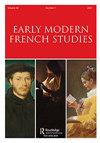阿尔诺先生的英雄行动:1641年索邦大学的戏剧插曲
IF 0.2
3区 历史学
Q2 HISTORY
引用次数: 0
摘要
本章讲述1641年7月25日在巴黎举行的一次大学活动。正在审查的论文取决于一个特定的神学观点:动词“to be”是否可以单独适用于上帝和人类。安托万·阿诺德(Antoine Arnauld)认为确实可以,他的学生查尔斯·瓦隆·德·博普伊斯(Charles Wallon de Beaupuis)现在也在效仿他。然而,当阿诺尔德在原地改变主意时,事情很快发生了意想不到的转折。在这里,我把《间日》一集放在1641年夏天的知识背景下,更广泛地说:当时间日一集的主人公也在回应笛卡尔的《沉思录》。皇家港历史学家随后对这一事件的叙述促使我们回到17世纪关于“générosité”和“宏伟”的伦理思想。本文章由计算机程序翻译,如有差异,请以英文原文为准。
‘L’Action héroïque de Monsieur Arnauld’: A Dramatic Episode at the Sorbonne, 1641
This chapter deals with a university viva that took place in Paris on 25 July 1641. The thesis that was being examined hinged on a particular theological point: the question of whether the verb ‘to be’ may apply univocally to God and to humans. Antoine Arnauld had argued that it could indeed, and his student Charles Wallon de Beaupuis was now following his example. However, events soon took an unexpected turn when Arnauld changed his mind in situ. Here, I set the viva episode in the intellectual context of the summer of 1641 more broadly: a time when the protagonists in the viva episode were also responding to Descartes’s Meditations. Subsequent narrations of the viva episode by historians of Port-Royal prompt us to return to seventeenth-century ethical thinking on ‘générosité’ and ‘grandeur’.
求助全文
通过发布文献求助,成功后即可免费获取论文全文。
去求助
来源期刊

Early Modern French Studies
Multiple-
CiteScore
0.10
自引率
0.00%
发文量
14
期刊介绍:
Early Modern French Studies (formerly Seventeenth-Century French Studies) publishes high-quality, peer-reviewed, original articles in English and French on a broad range of literary, cultural, methodological, and theoretical topics relating to the study of early modern France. The journal has expanded its historical scope and now covers work on the sixteenth, seventeenth, and eighteenth centuries. Within this period of French literary and cultural history, the journal particularly welcomes work that relates to the term ''early modern'', as well as work that interrogates it. It continues to publish special issues devoted to particular topics (such as the highly successful 2014 special issue on the cultural history of fans) as well as individual submissions.
 求助内容:
求助内容: 应助结果提醒方式:
应助结果提醒方式:


